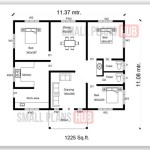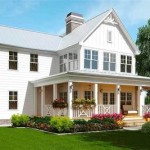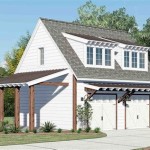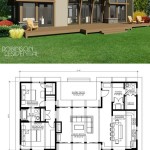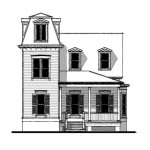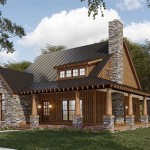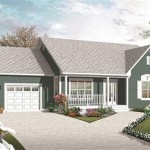Small House Plans With Basement: Essential Aspects to Consider
Small house plans with basements offer a unique opportunity to maximize space and functionality without sacrificing comfort or style. However, there are several essential aspects to consider when designing and building such a home. This article explores the key elements that contribute to a successful small house plan with a basement:
1. Basement Design
The basement should be designed to complement the overall floor plan of the house and its intended use. Whether it will serve as a living space, storage area, or home office, proper planning is crucial. Consider the following:
- Floor Layout: Optimize the basement's layout for the intended purpose, ensuring efficient movement and functionality.
- Ceiling Height: Ensure adequate ceiling height to avoid feeling cramped or claustrophobic. Aim for a minimum of 8 feet in height.
- Natural Lighting: Incorporate windows or skylights to introduce natural light and create a more inviting space.
- Ventilation: Provide proper ventilation systems to maintain air quality and prevent moisture buildup.
- Access: Plan for convenient access to the basement, such as an internal staircase or exterior entrance.
2. Structural Considerations
The structural integrity of the basement is paramount. Proper design and construction techniques are essential to ensure a safe and stable foundation:
- Foundation: Choose a suitable foundation type, such as poured concrete or concrete block, based on soil conditions and local building codes.
- Basement Walls: Utilize reinforced concrete or concrete block walls to provide strength and durability.
- Drainage: Install a reliable drainage system to prevent water seepage and foundation damage.
- Insulation: Insulate the basement walls and floor to minimize heat loss and improve energy efficiency.
- Vapor Barrier: Install a vapor barrier on the interior side of basement walls to prevent moisture penetration.
3. Energy Efficiency
Small house plans with basements offer opportunities for energy efficiency and sustainability:
- Air Sealing: Seal all air leaks around windows, doors, and other openings to prevent heat loss and improve indoor air quality.
- Insulation: Properly insulate the basement walls, floor, and ceiling to minimize heat loss and reduce energy consumption.
- Energy-Efficient Appliances: Choose energy-efficient appliances for the basement, such as a washer and dryer with ENERGY STAR ratings.
- Lighting: Utilize energy-efficient lighting fixtures, such as LED bulbs, to reduce energy usage.
- Heating and Cooling: Consider geothermal heating and cooling systems or other energy-efficient HVAC options.
4. Finishing Touches
Once the structural and functional aspects of the basement have been addressed, finishing touches can enhance its aesthetics and functionality:
- Flooring: Choose durable and moisture-resistant flooring materials, such as tile, vinyl, or laminate.
- Walls and Ceilings: Paint or wallpaper the basement walls and ceilings to create a desired ambiance.
- Lighting: Install adequate lighting fixtures to brighten the basement and create a welcoming atmosphere.
- Storage: Incorporate built-in storage solutions, such as shelves, cabinets, or closets, to maximize space and maintain organization.
- Decor: Personalize the basement with furniture, artwork, and other decorative elements to reflect your style and needs.
5. Legal and Building Codes
It is crucial to comply with all applicable building codes and obtain necessary permits when constructing a small house plan with a basement:
- Building Code Compliance: Ensure that the basement meets local building codes and safety regulations.
- Site Evaluation: Conduct a thorough site evaluation to assess soil conditions, drainage, and other factors that may affect construction.
- Permitting: Obtain all necessary building permits and inspections to ensure a legal and safe construction process.
- Professional Assistance: Consider consulting with an architect or engineer for guidance and professional expertise.
- Insurance: Make sure the house plan and construction process are covered by appropriate insurance policies.
Conclusion
Small house plans with basements offer a versatile and space-efficient solution for homeowners seeking additional living space or storage. By carefully considering the essential aspects outlined in this article, such as basement design, structural considerations, energy efficiency, finishing touches, and legal compliance, you can create a functional and comfortable home that maximizes your living space and enhances your lifestyle.

Small Cottage Plan With Walkout Basement Floor

Simple House Floor Plans 3 Bedroom 1 Story With Basement Home Design 1661 Sf Ranch

Small Cottage Plan With Walkout Basement Floor

Small Cottage Plan With Walkout Basement Floor House Plans

Hillside And Sloped Lot House Plans
Small 2 Bedroom Bungalow Plan Unfinished Basement 845 Sq Ft

10 Small House Plans With Open Floor Blog Homeplans Com

Cottage House Plan With 3 Bedrooms And 2 5 Baths 3800

Small Cottage Plan With Walkout Basement Floor

Basement Floor Plans Types Examples Considerations Cedreo
Related Posts

